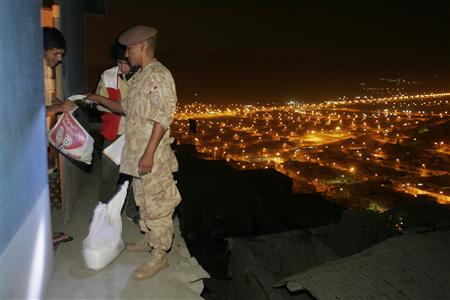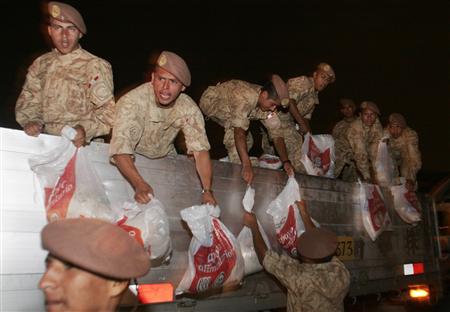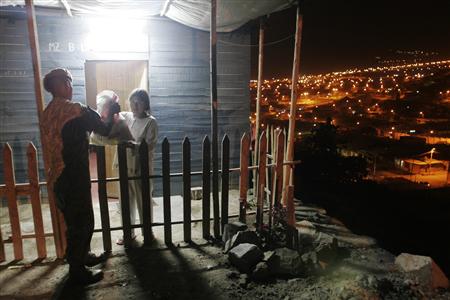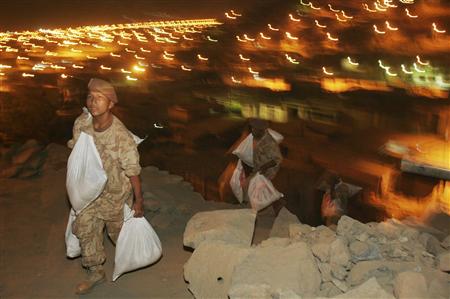Peru's army gives food to poor as Garcia struggles
April 18, 2008 - Reuters
By Dana Ford
SAN JUAN DE LURIGANCHO, Peru (Reuters) - Peruvian troops banged on the doors of the poor in night-time operations this week to hand out groceries and ease a crisis of rising food prices that has sunk President Alan Garcia's popularity.
Peru has enjoyed a six-year economic boom with growth now running at about 9 percent a year but the benefits have barely trickled down to the poor and many don't have enough to eat.
A global increase in food prices has raised concerns of political instability and Garcia, who took office in 2006, has seen his approval rating plummet to around 28 percent.

(above) A soldier delivers a bag containing food supplies to a man as part of a government
aid program in a shanty town on the outskirts of Lima early April 16, 2008.
(photo: REUTERS/Enrique Castro-Mendivil)
After months of trimming taxes on food imports and the central bank trying to curb inflation, his government is now deploying the army in a program of direct aid to reach the poorest of the poor.
Sara Carbajal, who lives in a wooden shack on the outskirts of the capital, is one of thousands the government is trying to reach. Awoken by noise outside her door one night this week, she carefully peeked outside and was handed a bag of food.
"Here, everyone is poor," said Carbajal, 32, pointing to hundreds of homes like hers, made from flimsy wood and aluminum scraps, perched precariously on a steep hill, where a lack of plumbing forces people to haul water in buckets up dusty foot paths.
"Prices are rising, which means salaries are falling. We buy much less now," said Carbajal, who lives with her husband and their two children.

(above) Soldiers unload bags containing food supplies from a truck before delivering
them to residents as part of a government aid program in a shanty town on the outskirts
of Lima early April 16, 2008 (Photo: REUTERS/Enrique Castro-Mendivil)
To discourage large crowds and to catch people when they are most likely to be at home, the army is delivering food at night, helped by social workers.
For the army, which only two decades ago raided peoples homes in search of left-wing Shining Path rebels, establishing trust in the middle of the night can be a challenge.
Aware that there could be more demand than there is supply of the food bags, the government does not announce in advance where the handouts will be made.
POLITICS OF POVERTY
About 42 percent of Peruvians, or 12 million people, live in poverty.

(above) A soldier delivers a bag containing food supplies to a woman as part of a
government aid program in a shanty town on the outskirts of Lima early April 16, 2008.
(Photo: REUTERS/Enrique Castro-Mendivil)
Over the last few months, prices for basic foods like rice and oil have surged at double-digit rates, eroding the spending power of the poor. Peru depends on food imports so more trouble is on the way as global prices climb.
So far this year, the central bank has slashed tariffs, raised interest rates, and increased deposit requirements for banks -- all in an effort to help ease inflationary pressures.
With the food program, the government is trying to reach into the neighborhoods where it has been losing support to left-wing leaders like Ollanta Humala.
Posters of Humala, who spooked investors by nearly beating Garcia in the 2006 election, line the walls of the San Juan de Lurigancho shantytown. He plans to run again in 2011, when Garcia, who now enjoys the firm support of Wall Street, cannot compete for a second consecutive term.

(above) Soldiers carry bags containing food supplies before delivering them to residents
as part of a government aid program in a shanty town on the outskirts of Lima
early April 16, 2008. (Photo: REUTERS/Enrique Castro-Mendivil)
Since taking office, Garcia has promised to avoid a repeat of his first term in the 1980s, when hyper-inflation battered living standards and made long lines for staples common.
Critics say Garcia is improvising for political gain with a program that just benefits Lima.
"How can you give out food in metropolitan Lima and not in provinces with worse poverty?" asked Juan Carlos Eguren, a congressman from a conservative party.
Meanwhile, those who live in rickety homes on the rocky hillsides overlooking Lima say they are thankful for the food, but point out the only electricity in their neighborhood is stolen from nearby power lines.
Some also said they were unsure what they would do for food once the government bags of rice, oil, and beans were gone.

(above) Soldiers receive bags containing food supplies before delivering them to
residents as part of a government aid program in a shanty town on the outskirts
of Lima early April 16, 2008. (Photo: REUTERS/Enrique Castro-Mendivil)
"Unfortunately, a lot of people remember what happened during Garcia's first administration," said Alejandro Reyes, a spokesman for the ministry of social development.
"The economy is awful," said Silvano Gutierrez, 28, who lives with his teenage brother and works as a day laborer. "This is helping people who really need it."
------
(Additional reporting by Teresa Cespedes; Editing by Terry Wade and Kieran Murray)
© Thomson Reuters 2008.